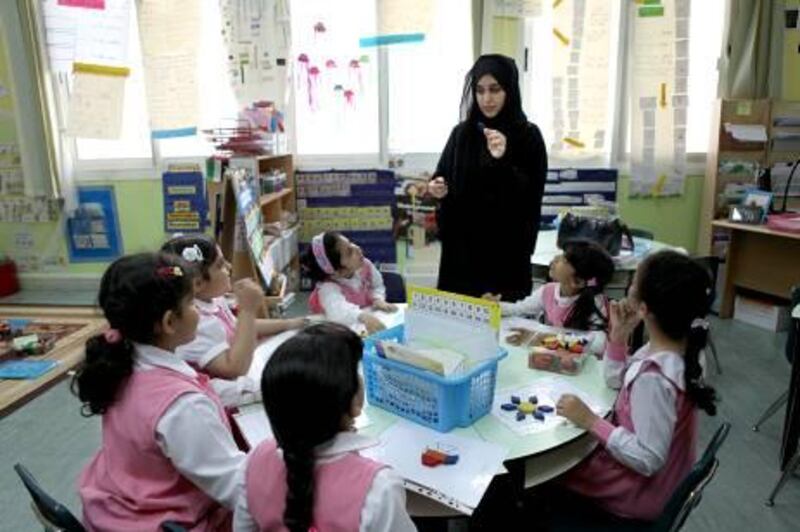ABU DHABI // In the classrooms they lurk, hungry little minds distracted by a natural love of undisciplined fun, waiting to drive their inexperienced teachers crazy.
But they will soon meet their match, as primary school teachers are being trained in the practical skills they will need to keep these disorderly little people on a clear road to learning.
"When I taught my first lesson the children were out of control," said Kaltham Al Malood, 22, one of 159 Emiratis hoping to graduate from the Emirates College for Advanced Education (ECAE) in June and be considered ready to teach in government schools from September.
"It worried me. Then my mentor helped me out and showed me how to manage the class by playing games rather than resorting to shouting."
Before she can graduate, Ms Al Malood must spend 10 weeks in government school classrooms.
There she will take lessons and complete tests as part of the first batch being taught the Abu Dhabi Education Council's (Adec's) New School Model standards.
The students at ECAE are the only ones in the country who will this year graduate under the new standards, which were introduced in 2010 and require the teacher to be proficient in English and able to teach several subjects using modern methods.
Dr Mugheer Al Khaili, the director general of Adec, last month said teachers graduating from federal universities did not have the right skills to teach in state schools.
So the authority has had to rely on thousands of licensed expatriate teachers from countries including the US, UK and Australia.
ECAE, which was recently accredited by the Ministry of Higher Education and Scientific Research, aims to fill the gap. Dr Lily Tennant, a coordinator at ECAE, said it had developed its programmes around Adec's requirements.
"Our programme puts a big emphasis on practical lessons," Dr Tennant said. "Students start gradually. They are exposed to a small group of pupils at school and then, towards the end, have to manage an entire class."
Student teachers will be assessed on class-management skills, ability to plan lessons and prepare material, and teaching style. They will be marked by the college evaluator and an assigned school mentor.
"After five weeks, we will see if there any gaps and work with the students to address them in the last weeks of their training," said Dr Tennant.
Mariam Hassan, 22, last week entered the Grade 2 class at the Al Afaq School for the first time.
She sat down with a group of pupils at their table and asked them to bring out their building blocks.
"Make eight groups of two each and tell me how much you get," said Ms Hassan in a maths lesson.
The children excitedly stacked the blocks and started counting.
"I know: it is 16," said one.
"This is so different from how I was taught in school," Ms Hassan said. "Now we have to teach with objects, technology, but most importantly make sure the pupils are engaged."
Every student teacher receives a stipend of Dh4,000 and another Dh1,500 to prepare material each month. Dr Tennant said this had been a motivator for the students to better perform.
Ebtesam Al Shehhi, 25, said one barrier to overcome was unlearning how her teachers had taught her.
"My personal challenge was how to make the lessons student-centred," Ms Al Shehhi said. "I had to videotape myself to see how much I was talking and whether I was allowing them to be interactive."
During lunch break at their assigned schools, concerns about low salaries, long working hours and heavy teaching loads - issues that have kept many Emiratis out of the profession - crept into conversations among the young women.
Sara Abdulla, 23, said Adec needed to address the problem.
"If the salaries are low and stress high, how can one concentrate on teaching the pupils?" she asked.
But most of the student teachers said they would continue in the profession. "Education is the basis of the country and they need us bilingual educators," Ms Abdulla said.
"We have very good expatriate teachers, but we are needed in classrooms to preserve the country's identity and teach the next generation their traditions and culture."






